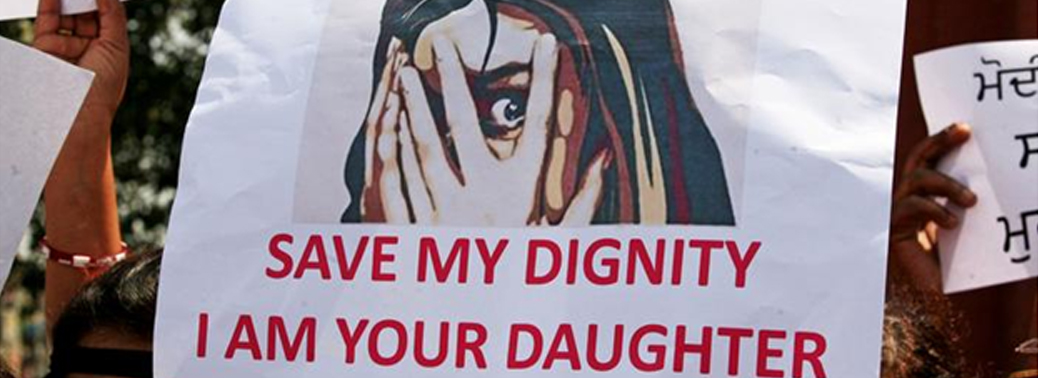STOP THE BRUTALITY: THE RAPE CULTURE IN INDIA
03, Dec 2019

Prelims level : Miscellaneous
Mains level : GS-II Welfare schemes for vulnerable sections of the population by the Centre and States and the performance of these schemes; mechanisms, laws, institutions and Bodies constituted for the protection and betterment of these vulnerable sections.
- The recent issue of rape in Hyderabad has triggered an intense debate on sexual violence, and the punishment that should be meted out to perpetrators. Rape is a stigma which exists in the society from a long time. The word rape is legally defined under Section-375[1] of Indian Penal Code, 1860. It defines the rape and also prescribes its punishment
- “While a murderer destroys the physical frame of the victim, a rapist degrades and defiles the soul of a Helpless Female.”

No Stranger to Crime:
- According to a National Crime Records Bureau (NCRB) (2017) report, around 93% Rapes in India Committed by Persons Known to the Victim. Large number of rape cases were filed against “family friends”, employers, neighbours or other known persons.
- In most cases, the victims are specifically not allowed to speak to the investigating team and police officers under the pressure of their families who are stuck between getting justice and what the society says for a girl being raped.
Gender Stereotyping in the Society:
- Socio-culturally transmitted attitudes toward women, rape, and rapists are often internalized from the male dominated viewpoint. The Patriarchal Mindset showcases women as weaker sex, which leads to sexual violence against women.
- This brings out the Misogynist Attitude prevalent in the Indian culture.
Disclosure of Identity and Victim Blaming:
- Despite clear legal prohibitions, victim’s names are used in media and social media, causing real damage to the mental state of the victims. This may intensify the aftershocks on victims including depression, fear, guilt-complex, suicidal-action, diminished sexual interest etc,.
- According to the Section228-A of IPC, no person can disclose the name of the rape victim and if anybody discloses the name, he shall be punished with either description for a term which may extend to two years and shall also be liable for fine.
- Despite these provisions and the punishments clearly specified, nothing much has changed. Poor journalism and the irresponsible social media have breached both ethical and legal norms, after every such incident.
- “Even the dead have their own dignity” – The Supreme Court, in a judgement, held the name and identity of a victim who was either dead or of unsound mind should also not be disclosed even under the authorisation of the next of the kin.
- Victim Blaming in India- In the Indian society, the victim of a sexual offence, especially a victim of rape, is treated worse than the perpetrators of the crime.
- Identification of the survivors, either through names or other characteristics that point out to them have become reasons of ill-treatment and sometimes even abandonment of the survivors by their family.
Justice Verma Committee Report:
- Justice Verma Committee was constituted to recommend amendments to the Criminal Law. The committee was set up after the Nirbhaya incident of December 2012.
- Rape: The Committee recommended that the gradation of sexual offences should be retained in the Indian Penal Code, 1860. The IPC differentiates between rape within Marriage and Outside Marriage. Under the IPC sexual intercourse without consent is prohibited.
- Verbal Sexual Assault: The Committee has suggested that use of words, acts or gestures that create an unwelcome threat of a sexual nature should be termed as sexual assault.
- To ensure Speedy Disposal of Complaints, the Committee proposed a tribunal must be set up and it should not function as a civil court but may choose its own procedure to deal with each complaint.
Way Forward:
- The government should create a separate cell under the Union Home Ministry to address the sexual crimes against the women.
- Schools should take forward the cause of sex education and also the sexual education.
- Reforms in police department to gender sensitize them, in treating the cases involving sexual violence.
- Implementing the recommendations of the Justice Verma Committee, to ensure timely justice.
- Make a directory of sex offenders in the lines of the western countries where such directories are used to trace paedophiles.
- Media, both visual and print media should be penalised, if they disclose name and photo of the victims.
- Conducting a Census of missing children in India, particularly girl children, might give the data of children who might have been trafficked.
- As women go about getting an education, doing work or simply doing daily chores, the inability of state and society to provide them – either safe passage or safe public spaces, effectively reduces their rights to that of second-class citizens.






